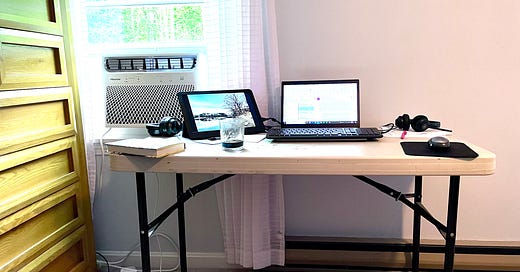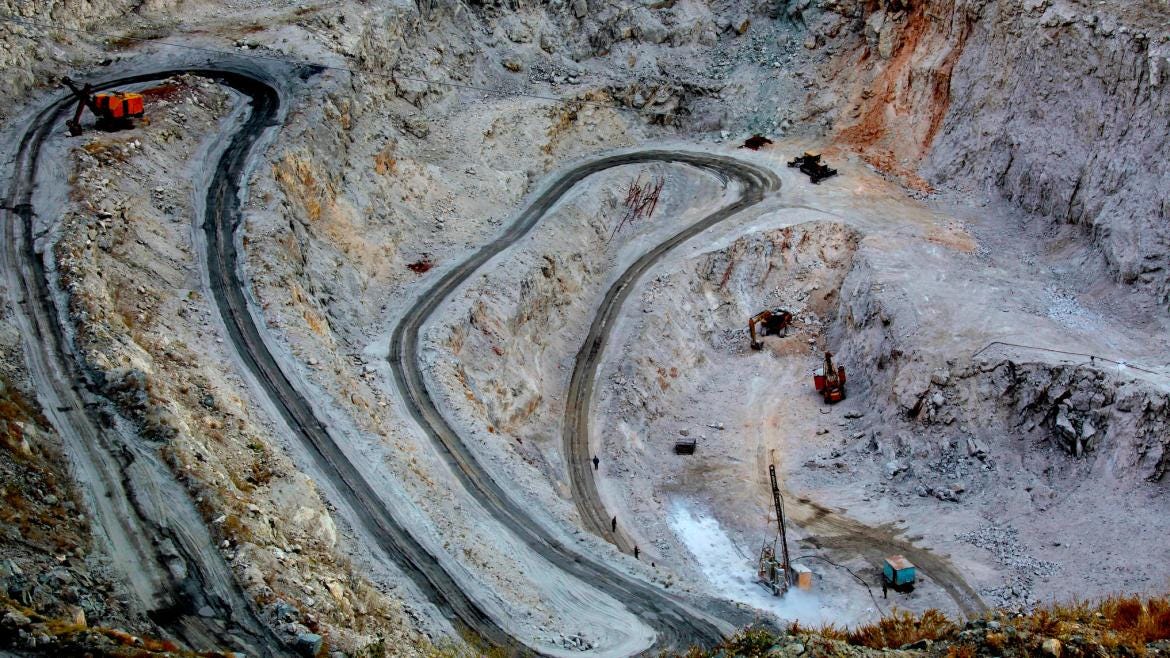Greetings from the Last Homely House (LHH)! School is out, so I have settled back in at the LHH to work. But… Daughter #2 and her roommates are still living with us (following the fire), and one of the roommates is living in the spare bedroom that I had converted into an office when the Pandemic started, so I have a makeshift home office in my own bedroom. Yep, that’s my chest of drawers on the left. And this is where I am writing this newsletter right now. The kids move into their new digs on June 6. We’ve enjoyed having them with us - they are good kids and nice to have around - but I think we will all enjoy having our space back.
This week I want to share with you some thoughts on transitioning to a low-carbon energy economy. I don’t understand climate science, so I don’t know how serious of a risk climate change represents. I am willing to posit that we do face a secular increase in temperature and that some portion of that increase is the result of human activity - specifically emissions into the atmosphere primarily from energy generation using fossil fuels. This increase in temperature could result in a variety of climate-related challenges that are dangerous enough to warrant reconsidering our current energy generation strategies, as well as considering some ways to mitigate the damage already done to the atmosphere.
If I believed that climate change represented an immediate, existential threat, as an individual I would look to make investments that would help protect myself and my family from that threat. I would invest in property significantly above sea-level, and preferably in colder zones - like in the North Country here in New Hampshire. If climate change is imminent, property in those areas should increase greatly in value and provide a safer place to live. On a societal level, I would seek to reduce the deficit and national debt as much as possible in order to ensure we had more resources available to address rising sea levels and expected more dangerous weather patterns. Human beings are remarkably adaptable, and with enough resources, we can overcome almost any challenge. I haven’t bought any property in the White Mountains, so I guess I don’t really think climate change disasters are imminent. Furthermore, property in colder climates does not seem to be rising at a faster rate than the rest of the country, so I don’t think anyone else is buying it either. So I don’t think most people really think climate disaster is imminent, including people who shout the most loudly about it. But let’s just assume that shifting away from fossil fuels is a good idea. What to do?
I learned about a new concept from the Top Traders Unplugged podcast (see below in Listen) last week. It is Energy Return on Investment (EROI). You calculate EROI relatively simply: it is the ratio of energy output per unit of energy input, or:
EROI = Energy Output / Energy Input
The basic idea is all energy production requires a certain amount of energy to produce it. The most primitive historical source of energy is burning wood. We burned wood for heat, to cook food, etc. The energy input for wood-based energy output would be cutting down a tree, chopping it up, and drying it so you could burn it. We burn wood as a supplement to heat our house in the winter here at the LHH, so wood is still a viable fuel. Walk down our street in the winter and you will smell wood smoke coming from most of the houses. My research on EROIs has turned up a lot of disagreement, but wood (biomass) seems to have an EROI of about 4.
Below is a table of EROIs (I took this from the Forbes article below in Read).
These ROIs are consistent with what I heard in the Top Traders podcast (and the G&R History of Energy video in Watch). Energy is the key to economic development. Everything we do requires energy, beginning with the most basic needs of food and shelter.
The G&R History of Energy video (below) explains how the discovery that coal could be burned in the 17th century in England was crucial to the Industrial Revolution and the beginning of the Great Enrichment . Moving from an economy built on an EROI of 4 to an EROI of 30 allowed an explosion of wealth such as the world had never seen.
It’s hard to see in this graph because later increases are so dramatic, but between 160 and 1800, GDP per capita doubled, thanks to coal. It is with the discovery and deployment of the steam engine (burning coal) in the late 1700s that the Industrial Revolution takes off.
In the 20th century we discovered oil, and in the beginning oil had an EROI of close to 100, but that has been declining as it becomes more expensive to drill for oil. And of course, both coal and oil are fossil fuels and burning them releases carbon into the atmosphere.
Wind has a good EROI when the wind is blowing. But wind is an intermittent and unpredictable source of energy. The “with energy storage” shows the average rather than peak EROI. Solar is also intermittent, but solar technology requires a lot of energy inputs to create. I love the idea of solar, but with an EROI of less than burning wood, we can’t count on it. Plus solar requires inputs that are environmentally harmful (see Rare Earth Minerals Pose Challenge in Clean Energy Transition below in Read).
In order to provide enough energy for the world so that people continue to rise out of poverty, we need cheap, reliable, and environmentally friendly energy. If we want to eliminate carbon-based energy production, we really only have one meaningful technology right now - nuclear. We have allowed ourselves to become scared of nuclear power. However, nuclear power is the safest form of energy after wind and solar. I wrote about that fact previously, citing this study. When airplanes crash, they are horrific events. I remember after 9/11 I was nervous about flying for a long time. But in reality, airplane travel is the safest form of travel that exists. It’s just that we aren’t programmed to think statistically - instead we rely on heuristics - stories that stick in our mind. This is known as “availability bias”. What comes to mind when I say nuclear power? Probably Fukushima and Chernobyl. But that is a mistake. Instead, you should think of nuclear as safe and having an incredible EROI, and carbon free.
Much of the climate debate is couched in emotion. When world leaders allow a 16 year old child to come scold them, you know you are not working in the world of science. This allows people to take sides based on emotion and political affiliation. Instead we should use numbers like EROI to make informed decisions.
One technology I am really excited about in the nuclear space is small modular reactors (SMRs). I have a couple of sources below about that emerging technology. I believe we should continue to invest in research on solar, wind, and hydro, but we should also continue to work on nuclear. This is especially true if you believe climate change-related disasters are imminent and we need to take immediate steps. Nuclear is a proven technology and is available with an astounding EROI.
So with that, willing good for all of you, I present you with the links!
Read
What: Forbes, EROI -- A Tool To Predict The Best Energy Mix
Why: Nice explainer on EROI, and the source of the graph above.
**
What: International Atomic Energy Agency, What are Small Modular Reactors (SMRs)?
https://www.iaea.org/newscenter/news/what-are-small-modular-reactors-smrs
Why: A nice explainer on SMRs. I like SMRs for a whole host of reasons. Smaller scale means it is possible to build redundancies, which improves energy security. Smaller also means they can be manufactured off-site and brought to the production location later - an opportunity to achieve manufacturing scale and reduce the cost of building plants.
**
What: The Friends Committee on National Legislation, Rare Earth Minerals Pose Challenge in Clean Energy Transition
https://www.fcnl.org/updates/2022-03/rare-earth-minerals-pose-challenge-clean-energy-transition
Why: Solar and wind have low EROIs in part because they are resource intensive to build. Both use “rare earths” - which come primarily from China. They come from China because China has few regulatory restrictions on mining. Rare earths have to be strip mined. Here’s a picture of a strip mine:
Solar is really cool, but making solar panels requires doing a lot of environmental damage.
**
Watch
What: G&R History of Energy (30 min)
Why: This is a really excellent economic history of energy. I highly recommend this lecture. You don’t have to watch it - you can just listen. It also explains EROI.
**
What: EROI - Energy Return on Energy Investment Explained (4 min)
Why: A very good, short explainer on EROI. I don’t agree with the video’s conclusion that we have to get used to a world where energy is more expensive and less available. That is code for “I don’t care about people starving and dying”. But the rest of the video is very useful.
**
What: Small Modular Reactors Explained - Nuclear Power's Future? (14 min)
Why: A nice explainer on SMRs and nuclear power.
**
Listen
What: Top Traders Unplugged: The Dark Side of Renewable Energy ft. Adam Rozencwajg (77 min)
https://www.toptradersunplugged.com/podcast/adam-rozencwajg-global-macro-series-may-11th-2022/
Why: Excellent discussion of energy and renewables. It’s not so dark. I think they were trying to make an investment manager sound sexy, which is hard to do. But they do talk about all of the topics I went into in this newsletter. This is where I learned about the concept of EROI.
Thanks for reading and see you next week! If you come across any interesting stories, won't you send them my way? I'd love to hear what you think of these suggestions, and I'd love to get suggestions from you. Feel free to drop me a line at mark.bonica@unh.edu , or you can tweet to me at @mbonica .
If you’re looking for a searchable archive, you can see my draft folder here: https://drive.google.com/drive/folders/1jwGLdjsb1WKtgH_2C-_3VvrYCtqLplFO?usp=sharing
Finally, if you find these links interesting, won’t you tell a friend? They can subscribe here: https://markbonica.substack.com/welcome
See you next week!
Mark
Mark J. Bonica, Ph.D., MBA, MS
Associate Professor
Department of Health Management and Policy
University of New Hampshire
(603) 862-0598
mark.bonica@unh.edu
Health Leader Forge Podcast:
http://healthleaderforge.org
“The meaning of life is to find your gift. The purpose of life is to give it away.” – Pablo Picaso







